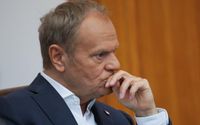In a bold move that has stirred the political pot in Poland, Prime Minister Donald Tusk recently announced a plan for the repolonization of the economy, declaring that "capital has nationality." This statement marks a significant shift in Tusk's long-standing approach to economic policy, which has often leaned towards globalization and market integration. The announcement comes amid a backdrop of rising discontent among Polish citizens regarding the economic landscape and the perceived disconnect between government actions and the realities faced by everyday people.
Tusk's declaration of repolonization seems to signal a departure from what he previously endorsed. For decades, he has been associated with the comprador elites of the Third Republic, who benefited from the privatization and sale of national assets. Critics argue that Tusk's sudden pivot to a more nationalistic economic stance is both opportunistic and cynical, likening it to a political maneuver aimed at regaining public trust as the country approaches elections.
According to Jakub Majmurek writing in Newsweek, Tusk's latest turn has placed him in a position similar to that of his political rival, Jarosław Kaczyński, albeit with a more socially attuned approach. Majmurek points out that Tusk's ability to adapt to changing political climates reflects a keen social awareness, stating, "When such things are announced by Kaczyński, it feels less convincing than when they come from Tusk, who has historically been open to market changes and Poland's integration into the global economy." This acknowledgment of Tusk's political agility raises questions about the authenticity of his current stance.
On April 17, 2025, Tusk was expected to unveil a comprehensive package of deregulation initiatives aimed at boosting the economy. However, in a surprising turn of events, he opted not to present these plans, citing the overwhelming disputes surrounding the proposed legislation. Journalists from RMF speculated that the contentious nature of the discussions among coalition partners would overshadow the positive messaging intended for the public. Tusk's decision to withhold the announcement just before the Easter holiday, a time when many families engage in political discussions, indicates a strategic retreat to avoid internal conflict becoming public spectacle.
In a recent meeting with energy sector representatives, Tusk stated that state-owned companies should prioritize the energy security of Poles over profits. This statement, while resonating with consumers who seek stability in energy costs, sent shockwaves through the investor community. Shares of state-owned energy companies dropped sharply following his remarks, highlighting the precarious balance Tusk must navigate between public sentiment and market expectations.
Amidst these developments, the Ministry of Culture and National Heritage allocated 50,000 PLN for a gender-themed film festival, which has sparked further debate about government spending priorities. Critics question whether such expenditures align with the pressing economic concerns faced by many Poles, especially as inflation remains a significant issue. Despite official data suggesting a stabilization of inflation around 5%, the purchasing power of average citizens tells a different story, as many struggle to make ends meet.
The political landscape in Poland is shifting, and Tusk's maneuvers are drawing attention from various quarters. As he attempts to redefine his political identity and align more closely with nationalist sentiments, the question remains whether these efforts are substantive or merely a strategic façade. Observers are left to ponder if Tusk's plans for repolonization are grounded in reality or if they represent an idealistic vision detached from the complexities of the current economic climate.
As the political climate heats up, Tusk's critics are quick to remind the public of his history of shifting positions. For instance, when faced with a financial crisis, he previously tapped into open pension funds, an action that some viewed as a desperate measure. This history raises doubts about the sincerity of his current proposals for economic repolonization.
In the context of an upcoming election, Tusk's recent statements and policy directions appear to be a calculated effort to resonate with a populace increasingly wary of external economic influences. The question remains whether he can convincingly deliver on these promises, especially as he faces challenges from both within his coalition and from the opposition.
As debates continue to unfold in Polish politics, the implications of Tusk's announcements will likely shape the narrative leading up to the elections. With the electorate's trust hanging in the balance, the Prime Minister must navigate the complexities of public sentiment and economic realities if he hopes to maintain his political standing.






